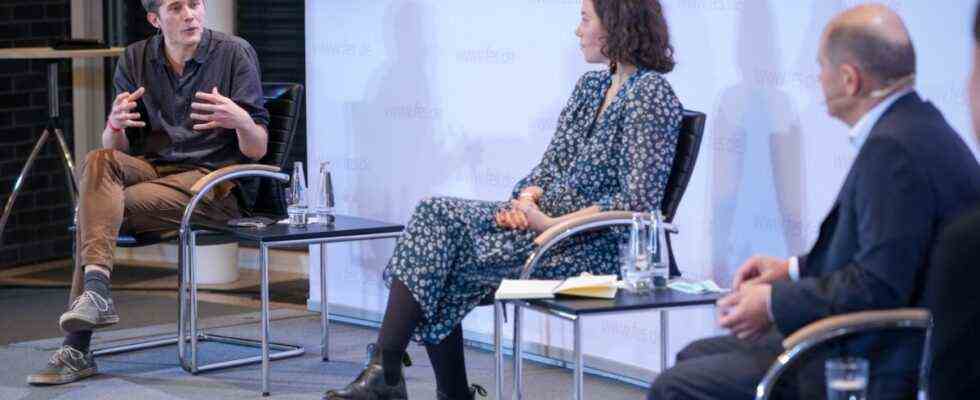About seven weeks after the end of their hunger strike, two young climate activists met presumably future Chancellor Olaf Scholz (SPD) for a public discussion on Friday evening. Scholz thus kept his promise with which he could persuade the two activists to break off their hunger strike shortly before the general election. These had called for a conversation with all three candidates, i.e. with Armin Laschet (CDU), Annalena Baerbock (Greens) and Olaf Scholz. But only the latter accepted.
So now they sat there, the former hunger strikers and the future Federal Chancellor, and finally talked to one another instead of about one another. The discussion, which took place in the Friedrich-Ebert-Stiftung in Berlin and was streamed live, proceeded as one would imagine when convinced young climate activists meet older politicians: Henning Jeschke, 21, and Lea Bonasera, 24, demanded Scholz to act immediately (“It’s about the survival of people!”), The SPD politician, on the other hand, appeased unconvincingly that there was a big climate conference taking place at which negotiations were taking place.
Jeschke and Bonasera belong to the “last generation”, a group of climate activists who went on hunger strike near the Reichstag building at the end of August to fight for a radical change in the climate. The two of them hadn’t eaten for four weeks, and in the end they hadn’t drunk anything either. Above all, Jeschke, with his sunken face and starved eyes, made headlines for days and caused increasing public concern. These should be gone for now, Jeschke’s cheeks are back and otherwise the young man seems to be physically recovered and healthy that evening. However, his anger at the supposed inaction of politics has remained – and Scholz feels it.
In the first ten minutes, Jeschke lets his – somewhat more diplomatic – colleague Bonasera go first. “Yes, I am desperate,” the activist introduces her accusation in a shaky voice, “we are in a deadly climate crisis and we have a policy that has the possibility of turning things around, but always takes measures knowingly and willingly. that lead us further into this climate crisis. ” Silence. Then Scholz replied, as expected, emotionless: “I do believe that we have challenges …”, and you can already hear keywords with little informative value (“man-made climate change, no doubt, high time to do something”) what the young activists say of course not wanting to let go.
One dystopia follows another
Bonasera once again lists all the warnings that even the greatest climate nuisance can give: Exceeding 1.5 degrees, floods, droughts, crop failures, only three to four years to prevent the worst. To illustrate how urgent the situation is, the activist picks up the glass: “If I drop this, it will break,” she says.
Scholz tries to calm down again and chooses what is probably the most worrying argument for climate activists: climate-neutral, “economic production methods that make it possible to be a strong, efficient industrial country”. At one point he even said: “Maintain wealth and gain additional wealth.”
Then Bonasera’s colleague Jeschke takes the floor – and doesn’t let go. He speaks of billions of people along the equator who would be robbed of their living space, of a “climate hell”, the house that is on fire, the famine in Madagascar. One dystopia follows another. “It’s about billions of people who are dying. That actually leaves you cold, Mr. Scholz, is there no emotion?”
And it is precisely this request to speak that is probably the best summary of the evening’s discussion. There are two desperate young people sitting there who probably want nothing more than a politician who can read exactly that from their lines: fear. And who can not only read it out, but also take it and transform it into hope. If not with convincing proposed solutions, then at least with empathy. But on the other side sat Scholz. And one might believe that he has empathy for these young people, but he cannot show it.
But the climate activists also show weaknesses. Scholz says: “The reference to the seriousness of the problem is not linked to a specific proposal for a solution.” Just listing dystopias does not lead to a better future. And so, in the end, Jeschke and Bonasera let themselves be carried away with two specific demands. First: an agricultural turnaround by 2030. Second: an immediate law that forbids throwing food away. Otherwise there will be “non-violent but massive protests” in January. It remains exciting.

